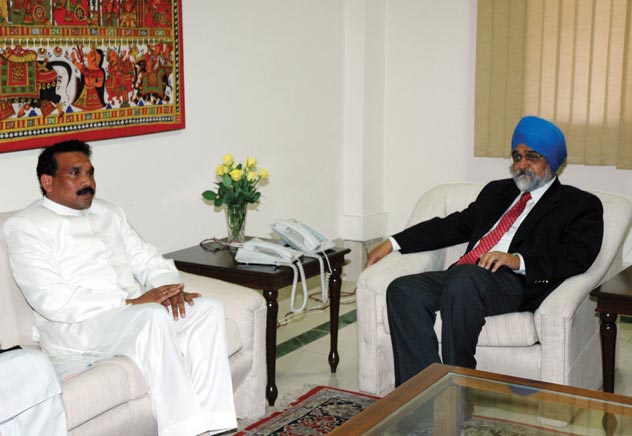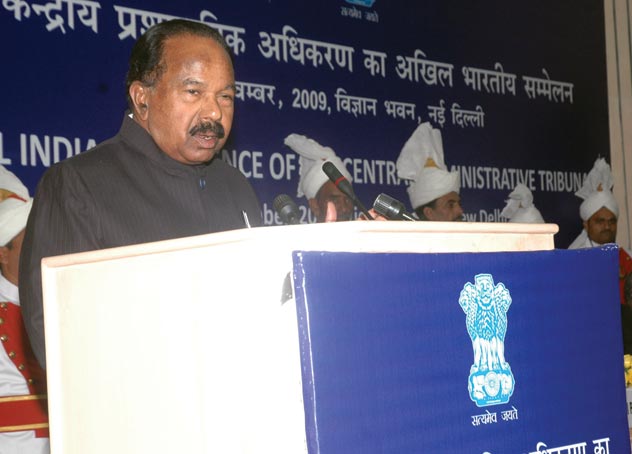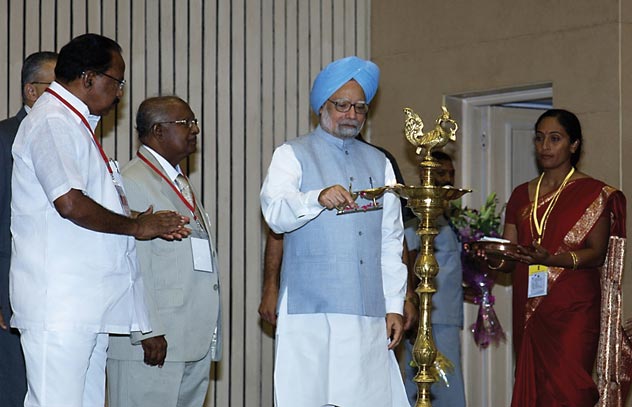SUBCONTINENT
Battling Corruption: Uphill Task
Removal of poverty is one of India’s biggest challenges, and battling corruption is a crucial aspect of meeting this goal, writes Priyanka Bhardwaj.

(Above): Chief Justice of India K.G. Balakrishnan being welcomed by Central Bureau of Investigation director Ashwani Kumar at the inauguration of a national seminar on “Fighting Crimes Related to Corruption,” in New Delhi Sept. 12. A three-judge bench of the Delhi High Court has been constituted to decide whether the office of the CJI can be included in the RTI Act and declaration of assets by apex court judges be subject to the transparency law. (Photo: Press Information Bureau)
The bid to bring in transparency in legislative, executive and judicial arms of the Indian polity is gathering some momentum.
Even as elected representatives have to declare their assets before filing nominations for elections, the heat is now on upon other Indian power players to put on paper their net worth.
Though such efforts are not going to eliminate rampant corruption in the country, it is a step in the right direction.
Earlier this month, the apex Supreme Court carried on its Web site details of assets of the Chief Justice of India along with twenty other judges.
The move has been welcomed, even as noted Supreme Court advocate Prashant Bhushan has said: “This is not enough and the declaration should be made mandatory and not voluntary.”
Meera Subramanyam, a legal expert, said, “The law must be equally applicable to public employees in all domains of legislature, executive and judiciary and must relate to their (income tax) IT-returns and wealth tax returns as well.”
On the cards is a new comprehensive bill to deal with accountability of High Court and Supreme Court judges and their assets declaration.

(Above): Erstwhile Jharkhand Chief Minister Madhu Koda (l) meeting with Planning Commission deputy chairman Montek Singh Ahluwalia to finalize the Annual Plan 2007-08 of the state in New Delhi Feb. 21, 2007. Koda is currently being chased by investigative agencies for millions of dollars of illegal money stored in Swiss accounts which was used for purchasing properties and mines all over the world. (Photo: Press Information Bureau)
Union Law Minister Veerappa Moily has asserted: “The aim of the bill will be to set up a mechanism to look into corruption allegations against judges but the impeachment of judges will remain Parliament’s right.”
On a previous occasion a bill that exempted judges from making public their assets and gave them immunity against an inquiry was shot down by the opposition political parties.
The controversy on the issue of declaration of assets of judges erupted in November 2007 when Right to Information activist Subhash C. Aggarwal filed a plea in the Supreme Court.
A three-judge bench of the Delhi High Court has been constituted to decide whether the office of the CJI can be included in the RTI Act and declaration of assets by apex court judges be subject to the transparency law.
Such efforts are overdue as corruption is an endemic phenomenon that has only got worse in the country.
India has slipped in the global corruption perception index released annually by corruption watchdog Transparency International, dipping from 72nd to the 85th slot, in a list of 180 countries.
In terms of integrity score India in 2008 stood at 3.4, down from 3.5 in 2007 and 3.3 in 2006. China ranked better at 3.6.
The Bribe Payers Index shows that India along with other emerging economies is among the worst while engaging in business abroad.
The 2009 Global Corruption Barometer by TI found that 58 percent Indian respondents identified politicians to be single most corrupt individuals.
According to the “Indian Corruption and Bribery Report,” 14 out of 100 people demand bribes in India. In 2006, estimated bribes to the legal system stood over Rs 26 billion.

(Above): Indian Minister for Law & Justice M. Veerappa Moily speaking at the inauguration of the All India Conference of the Central Administrative Tribunal in New Delhi Nov. 1.
The Moily-headed Administrative Reforms Commission has described corruption as an ethical issue and a primary cause for India’s lagging in growth and social services. (Photo: Press Information Bureau)
The report indicated the “big bosses” may be 1-2 percent of all officials but then they are the ones most involved in financial crimes compared to lower level functionaries. Bribes are generally over the range of $5,000.
No state or service has been found anywhere near ‘’zero corruption’’ level by any studies conducted so far by any forum.
Indeed, the culture of corruption permeates througout Indian society.
A recent survey of retail crime and loss in the world says India has the highest retail shrinkage at 3.2 percent globally.
Retail shrinkage is the loss of products due to shoplifting, employee theft, paperwork errors and supplier fraud.
India’s retailers assert that the reasons for the $2.6 billion loss are shoplifting and employee theft.
The survey, the third annual Global Retail Theft Barometer 2009, covered 1,069 large retailers across 41 countries between July 2008 and June 2009.
In this context, the Veerappa Moily headed Administrative Reforms Commission has described corruption as an ethical issue and a primary cause for India’s lagging in growth and social services.
The report called for focus on the misuse of power, monopoly and discretion without accountability especially by bureaucrats, errant judges and power-at-any-cost politicians.
But, all is not lost.
The RTI Act-2005, for example, has engendered a movement of sorts amongst citizens to pin down all kinds of fraud.
The RTI Act-2005 arms citizens with the mechanism to scrutinize government and public processes and ensure transparency and it is proving an important tool to effectuate democracy in concrete ways.
The TI 2009 has pointed out that the perception of government effectiveness in relation to addressing corruption had improved from 2007.
About 42 percent of the people found that actions such as the RTI Act in the fight against corruption were effective.
But there is much more to be done. The adoption of the RTI Act in earnest is a long way off. And so is elimination of corruption.

(Above): Prime Minister Manmohan Singh lighting the lamp to inaugurate the joint conference of chief ministers of the states and chief justices of the High Courts in New Delhi Aug. 16. Indian Law & Justice Minister M. Veerappa Moily and Chief Justice K.G. Balakrishnan are also seen. (Photo: Press Information Bureau)
Last month, there was a controversy about the appointment of Karnataka High Court Justice P.D. Dinakaran to the Supeme Court by a collegium headed by Chief Justice K.G. Balakrishnan.
The furor centered on the alleged land grabbing of over 500 acres by Dinakaran in Tiruvallur district of Tamil Nadu.
The Dinakaran appointment has been put on hold.
Former Jharkhand Chief Minister Madhu Koda is currently being chased by investigative agencies for millions of dollars of illegal money stored in Swiss accounts which was used for purchasing properties and mines all over the world.
Recently anti-corruption crusader Anna Hazare asked the Maharashtra government to make it mandatory for all government employees to publicly declare their assets as is the case with the elected representatives. Maharashtra was the first state across the country to enact the RTI.
Hazare maintained that if members of parliament and state legislature can file an affidavit on their assets, even government employees can declare their assets.
Removal of poverty is one of India’s biggest challenges. Exclusion of corruption is a crucial aspect of meeting this goal.
|